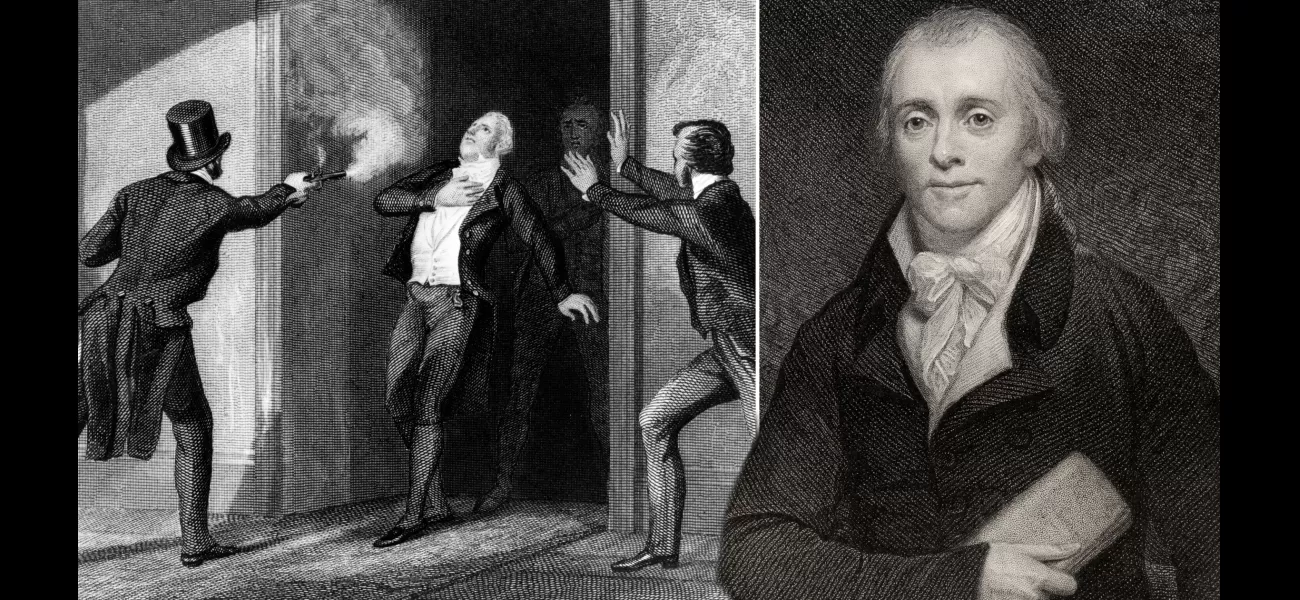The sole British PM to be assassinated is now largely overlooked.
Few people in Britain are familiar with the dramatic tale of how Spencer Perceval died.
May 12th 2024.

The House of Commons holds a special place in British history, with the names of prominent prime ministers like Thatcher, Churchill, Lloyd George, Gladstone, and Disraeli still ringing in the ears of history buffs and the general public alike. However, one name that doesn't often come up in these discussions is that of Spencer Perceval. While his predecessors may be remembered for their political achievements, Perceval's legacy is defined by a tragic event that occurred during his time as prime minister. He holds the unfortunate title of being the only British leader to have been killed while in office.
The circumstances surrounding Perceval's assassination are so dramatic that it's a wonder the story has faded from our collective memory. But it's not really a story about Perceval himself, but rather about a man named John Bellingham. Bellingham hailed from the town of St Neots, and his life took an unexpected turn when he was imprisoned in Russia for five years. As a merchant, he had traveled to Russia on business, but was falsely accused of not repaying a debt and thrown into jail.
During his time in prison, Bellingham's resentment grew as he felt he had been wronged and that no one was willing to help him. He wrote to the British Ambassador in St Petersburg, but received no assistance. Even after his release, he continued to seek compensation for his false imprisonment, but was met with rejection. Finally, after years of frustration and feeling like he had no other recourse, Bellingham made a fateful decision: he would shoot the prime minister.
Perceval, a father of 13 and a former lawyer who held the positions of both attorney-general and prime minister, was making his way through the House of Commons lobby on May 11, 1812 when Bellingham, who was waiting on a bench, shot him at close range. Perceval cried out in shock and pain, but it was too late. He collapsed and was taken to a nearby room, while Bellingham calmly returned to his bench, knowing that he would not escape the consequences of his actions.
The aftermath of Perceval's death was chaotic, with a government that was already facing public discontent now thrown into further turmoil. Bellingham was quickly arrested and sentenced to death, with no mercy shown for his debt troubles. The public's anger was palpable, and there was even fear that a mob might try to help Bellingham escape. In the end, he was hanged just a week after the assassination.
Perceval's successor, the Earl of Liverpool, continued to lead the country for 15 years, facing challenges such as war with the United States and the Peterloo massacre. But Perceval's legacy lived on, with a plaque dedicated to him in St Stephen's Hall and a man in the House of Lords claiming ancestry to Bellingham. It's a reminder that even in the halls of power, the past is never truly forgotten.
The circumstances surrounding Perceval's assassination are so dramatic that it's a wonder the story has faded from our collective memory. But it's not really a story about Perceval himself, but rather about a man named John Bellingham. Bellingham hailed from the town of St Neots, and his life took an unexpected turn when he was imprisoned in Russia for five years. As a merchant, he had traveled to Russia on business, but was falsely accused of not repaying a debt and thrown into jail.
During his time in prison, Bellingham's resentment grew as he felt he had been wronged and that no one was willing to help him. He wrote to the British Ambassador in St Petersburg, but received no assistance. Even after his release, he continued to seek compensation for his false imprisonment, but was met with rejection. Finally, after years of frustration and feeling like he had no other recourse, Bellingham made a fateful decision: he would shoot the prime minister.
Perceval, a father of 13 and a former lawyer who held the positions of both attorney-general and prime minister, was making his way through the House of Commons lobby on May 11, 1812 when Bellingham, who was waiting on a bench, shot him at close range. Perceval cried out in shock and pain, but it was too late. He collapsed and was taken to a nearby room, while Bellingham calmly returned to his bench, knowing that he would not escape the consequences of his actions.
The aftermath of Perceval's death was chaotic, with a government that was already facing public discontent now thrown into further turmoil. Bellingham was quickly arrested and sentenced to death, with no mercy shown for his debt troubles. The public's anger was palpable, and there was even fear that a mob might try to help Bellingham escape. In the end, he was hanged just a week after the assassination.
Perceval's successor, the Earl of Liverpool, continued to lead the country for 15 years, facing challenges such as war with the United States and the Peterloo massacre. But Perceval's legacy lived on, with a plaque dedicated to him in St Stephen's Hall and a man in the House of Lords claiming ancestry to Bellingham. It's a reminder that even in the halls of power, the past is never truly forgotten.
[This article has been trending online recently and has been generated with AI. Your feed is customized.]
[Generative AI is experimental.]
0
0
Submit Comment





